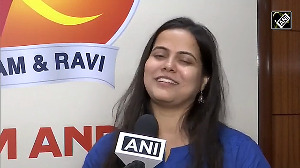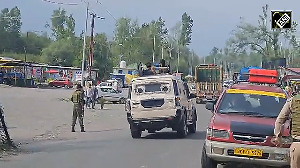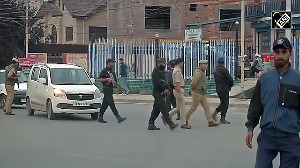India's insistence on continuing to buy Iranian oil defying United States sanctions, drawing common approach on China, Af-Pak situation and peace negotiations with Taliban dominated the talks of Foreign Secretary Ranjan Mathai, who concluded his maiden bilateral visit in Washington on Thursday.
The "serious situation" in Maldives after the resignation of President Mohamed Nasheed and the multi-billion jets deal found passing mentions during Mathai's meetings spread over three days in Washington, sources said.
Issues like the implementation of the civilian nuclear agreement, the upcoming India-US Strategic Dialogue and finding a common roadmap of global and regional issues were also discussed, they said.
In a special gesture, Secretary of State Hillary Clinton dropped by when Mathai was meeting Deputy Secretary William Burns, reflecting the importance she attaches to Indo-US ties.
The meeting between the Indian foreign secretary and his American counterpart Windy Sherman lasted more than four hours at the Foggy Bottom headquarters of the State Department on Tuesday.
Mathai and his team of diplomats spent most part of his day at the State Department on Tuesday, except for their visit to the White House to meet officials of Obama's National Security team.
Mathai also met the Special US Representative for Afghanistan and Pakistan Marc Grossman. The recent peace talks with the Taliban dominated the talks between the two officials.
Iran, as expected, appears to be the immediate irritant in the ties between India and the US, which was evident when Mathai and his team of diplomats drove down to the Capitol
Hill to hold a series of meetings with top US lawmakers.
While there was a sense of understanding among officials of the Barack Obama administration on the constraints that India has because of which it can't stop buying oil from Iran, several top lawmakers are understood to have strongly confronted Mathai and didn't appear to be convinced by his arguments.
He even gave an Afghan perspective to his argument, noting that New Delhi needs to maintain a good relationship with Tehran if it has to continue developmental works in
Afghanistan, of which the US has been very appreciative of, sources said.
Indian and US officials spent considerable part of their discussion on how to draw in Bejing in the Asian architecture and develop a common line of action on growing Chinese influence in the region. They also shared notes on their respective bilateral relationships with China.
"The conversations included virtually every topic on the bilateral and multilateral agenda with India," said State Department spokesperson Victoria Nuland.
The issues discussed included joint cooperation to combat terrorism and violent extremism, defence cooperation, civil nuclear cooperation, shared energy security interests, regional and economic integration along the New Silk Road, and joint interests in Africa, East Asia and the Middle East.
"We were pleased to host Indian Foreign Secretary Mathai. He was here for a full day of extremely comprehensive talks. The Secretary dropped by on Deputy Secretary Burns' meetings with him," she said.
"We look forward to an ambitious and productive bilateral agenda for 2012, including the US-India Strategic Dialogue and continuing meetings of the CEO Forum, Higher Education Summit and Homeland Security Dialogue, among other cabinet-level engagements," a State Department official said.











 © 2025
© 2025